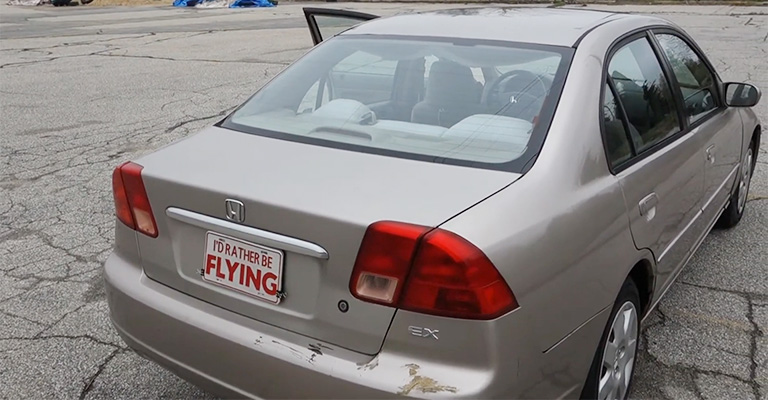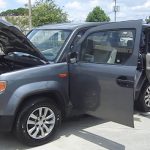The 2001 Honda Civic is a popular compact car that has been widely praised for its reliability and fuel efficiency. However, like any vehicle, it is not immune to problems. Some common issues reported by owners of the 2001 Honda Civic include transmission failure, engine stalling, and problems with the suspension and steering.
Additionally, some owners have reported issues with the air conditioning system and the electrical system. It is important for owners of the 2001 Honda Civic to be aware of these potential problems and to address them as soon as possible in order to avoid further damage to the vehicle.

2001 Honda Civic Problems
1. Airbag Light Due to Failed Occupant Position Sensor
This problem can occur when the sensor that detects the presence and position of the driver or front passenger fails. This can cause the airbag light to turn on, indicating a problem with the airbag system.
In some cases, the airbags may not deploy as intended in the event of a collision, which can increase the risk of injury.
2. Bad Engine Mounts May Cause Vibration, Roughness, and Rattle
The engine mounts in the 2001 Honda Civic are responsible for holding the engine in place and reducing vibration and noise. If the engine mounts fail, it can cause excessive vibration, roughness, and rattle, especially when the vehicle is idling or accelerating.
This can be annoying for the driver and passengers, and it can also cause other components to wear out prematurely.
3. Power Window Switch May Fail
The power window switch allows the driver and passengers to operate the power windows. If the switch fails, it can be difficult or impossible to raise or lower the windows. In some cases, the switch may become stuck in the up or down position, which can be inconvenient and potentially dangerous if the window is stuck open or closed.
4. Hood Release Cable May Break at Handle
The hood release cable is responsible for allowing the driver to open the hood of the vehicle. If the cable breaks at the handle, it can be difficult or impossible to open the hood, which can make it difficult to access the engine compartment.
In some cases, the cable may become stuck, which can be frustrating and may require the assistance of a mechanic to fix.
5. Possible Shift Control Solenoid Fault
The shift control solenoid is responsible for controlling the gears in the transmission. If the solenoid fails, it can cause problems with shifting, such as difficulty shifting into or out of gear or the transmission slipping or failing to engage. This can be a serious problem that can affect the performance and safety of the vehicle.
6. Wipers Won’t Park Due to Windshield Wiper Motor Failure
The windshield wiper motor is responsible for driving the wipers and allowing them to park in the correct position when not in use. If the motor fails, it can cause the wipers to fail to park properly, which can be annoying and may make it difficult to see through the windshield in wet conditions.
In some cases, the wipers may not work at all, which can be a safety hazard.
7. Cracked Exhaust Manifold/Catalytic Converter
The exhaust manifold and catalytic converter are responsible for directing exhaust gases away from the engine and reducing emissions.
If either of these components cracks, it can cause exhaust gases to leak, which can be dangerous and can also lead to decreased performance and fuel efficiency. In some cases, the crack may be large enough to cause a loud noise or vibration when driving.
8. Warped Front Brake Rotors May Cause Vibration When Braking
The brake rotors are a critical component of the braking system, and they are responsible for providing a surface for the brake pads to press against in order to slow the vehicle. If the rotors become warped, it can cause a vibration when braking, which can be uncomfortable and may also affect the effectiveness of the brakes.
9. Front Compliance Bushings May Crack
The compliance bushings are rubber bushings that are located in the suspension system and are responsible for absorbing shock and reducing vibration. If the bushings crack, it can cause increased noise and vibration when driving, as well as decreased handling and stability.
10. Engine Rear Main Oil Seal May Leak
The rear main oil seal is located between the engine and the transmission, and it is responsible for preventing oil from leaking out of the engine. If the seal fails, it can cause oil to leak, which can lead to decreased oil levels and potentially cause damage to the engine.
A leaking rear main oil seal should be addressed as soon as possible in order to prevent further damage.
11. Coolant Leaking and Engine Overheating
Coolant is a vital fluid that is responsible for regulating the temperature of the engine. If the engine is overheating, it can be caused by a coolant leak. A coolant leak can also cause the coolant level to become low, which can lead to further overheating and potentially cause damage to the engine.
It is important to address a coolant leak as soon as possible in order to prevent further issues.
12. Drivers Seat Bushings Can Wear Out
The seat bushings are responsible for allowing the seat to move smoothly and providing cushioning. If the bushings wear out, the seat may become stiff and uncomfortable, and it may also make it difficult to adjust the seat position.
13. The Air Cleaner Housing May Crack
The air cleaner housing is responsible for protecting the air filter and preventing dirt and debris from entering the engine. If the housing cracks, it can allow dirt and debris to enter the engine, which can cause damage and affect performance.
14. Plugged Moon Roof Drains May Cause Water Leak
The moon roof drains are responsible for directing water away from the moon roof and preventing leaks. If the drains become plugged, it can cause water to leak into the vehicle, which can be annoying and may cause damage to the interior.
15. Front Struts May Leak Oil
The front struts are a critical component of the suspension system, and they are responsible for providing support and stability to the front of the vehicle. If the struts leak oil, it can cause a decrease in performance and stability, as well as a reduction in the lifespan of the struts.
It is important to address a strut oil leak as soon as possible in order to prevent further issues.
Possible Solution
| Problem | Possible Solution |
| Airbag Light Due to Failed Occupant Position Sensor | Replace the sensor |
| Bad Engine Mounts May Cause Vibration, Roughness, and Rattle | Replace the engine mounts |
| Power Window Switch May Fail | Replace the switch |
| Hood Release Cable May Break at Handle | Replace the cable |
| Possible Shift Control Solenoid Fault | Replace the solenoid |
| Wipers Won’t Park Due to Windshield Wiper Motor Failure | Replace the motor |
| Cracked Exhaust Manifold/Catalytic Converter | Replace the manifold/converter |
| Warped Front Brake Rotors May Cause Vibration When Braking | Replace the rotors |
| Front Compliance Bushings May Crack | Replace the bushings |
| Engine Rear Main Oil Seal May Leak | Replace the seal |
| Coolant Leaking and Engine Overheating | Locate and repair the leak |
| Drivers Seat Bushings Can Wear Out | Replace the bushings |
| The Air Cleaner Housing May Crack | Replace the housing |
| Plugged Moon Roof Drains May Cause Water Leak | Clear the drains |
| Front Struts May Leak Oil | Replace the struts |
2001 Honda Civic Recalls
| Recall Number | Recall Issue |
| 19V501000 | Passenger Air Bag Inflator Ruptures During Deployment |
| 19V499000 | Driver’s Air Bag Inflator Ruptures During Deployment |
| 19V182000 | Driver’s Frontal Air Bag Inflator Ruptures During Deployment |
| 18V268000 | Front Passenger Air Bag Inflator Potentially Installed Improperly During Replacement |
| 15V370000 | Front Passenger Air Bag Defective |
| 15V320000 | Driver’s Front Air Bag Defective |
| 14V700000 | Front Airbag Inflator Module |
| 02V051000 | Defective Seat Belt Buckles |
| 01V380000 | Defective Seat Belt Buckles |
| 04V086000 | Low Beam Headlight Issue |
| 07V512000 | Add Insulation for the CNG Tank |
| 01V329000 | Concern with the Air Cleaner Box |
| 01V182000 | Possible Fuel Filler Neck Tube Fuel Leak |
Recall 19V501000:
This recall involves the passenger airbag inflator, which may rupture during deployment, spraying metal fragments. This can cause injury or death to the occupants of the vehicle.
Recall 19V499000:
This recall involves the driver’s airbag inflator, which may rupture during deployment, spraying metal fragments. This can cause injury or death to the occupants of the vehicle.
Recall 19V182000:
This recall involves the driver’s frontal airbag inflator, which may rupture during deployment, spraying metal fragments. This can cause injury or death to the occupants of the vehicle.
Recall 18V268000:
This recall involves the front passenger airbag inflator, which may have been installed improperly during replacement. This can cause the airbag to deploy improperly in the event of a crash, increasing the risk of injury.
Recall 15V370000:
This recall involves the front passenger airbag, which may be defective. In the event of a crash, the inflator could rupture, causing metal fragments to strike the passenger seat occupant or other occupants, potentially causing serious injury or death.
Recall 15V320000:
This recall involves the driver’s front airbag, which may be defective. In the event of a crash, the inflator could rupture, causing metal fragments to strike the driver or other occupants, potentially causing serious injury or death.
Recall 14V700000:
This recall involves the front airbag inflator module, which may be defective. In the event of a crash, the inflator could rupture, causing metal fragments to strike the vehicle occupants, potentially resulting in serious injury or death.
Recall 02V051000:
This recall involves the seat belt buckles, which may be defective. The rear seat belts will work properly and provide protection in a crash, but the owner may experience difficulty unfastening the belt after the crash.
Recall 01V380000:
This recall involves the seat belt buckles, which may be defective. The rear seat belts will work properly and provide protection in a crash, but the owner may experience difficulty unfastening the belt after the crash.
Recall 04V086000:
This recall involves the low beam headlights, which may fail unexpectedly. This could result in a crash.
Recall 07V512000:
This recall involves certain 1998-2007 Civic CNG vehicles, which need to have insulation added to the CNG tank. This is to prevent the tank from rupturing, exploding, and ejecting from the vehicle.
Recall 01V329000:
This recall involves the air cleaner box, which may have a problem. If a plastic piece lodges in the throttle body, the throttle could stick in a partially open position. This could cause the car to continue to maintain speed when the driver is expecting it to slow, potentially resulting in a crash.
Recall 01V182000:
This recall involves the fuel filler neck tube, which may have a fuel leak. In a collision, the tube could disconnect from the fuel tank, resulting in fuel leakage. Fuel leakage in the presence of an ignition source could result in a
Problems and Complaints Sources
https://repairpal.com/2001-honda-civic/problems
https://www.carcomplaints.com/Honda/Civic/2001/
All Honda Civic years we talked –




